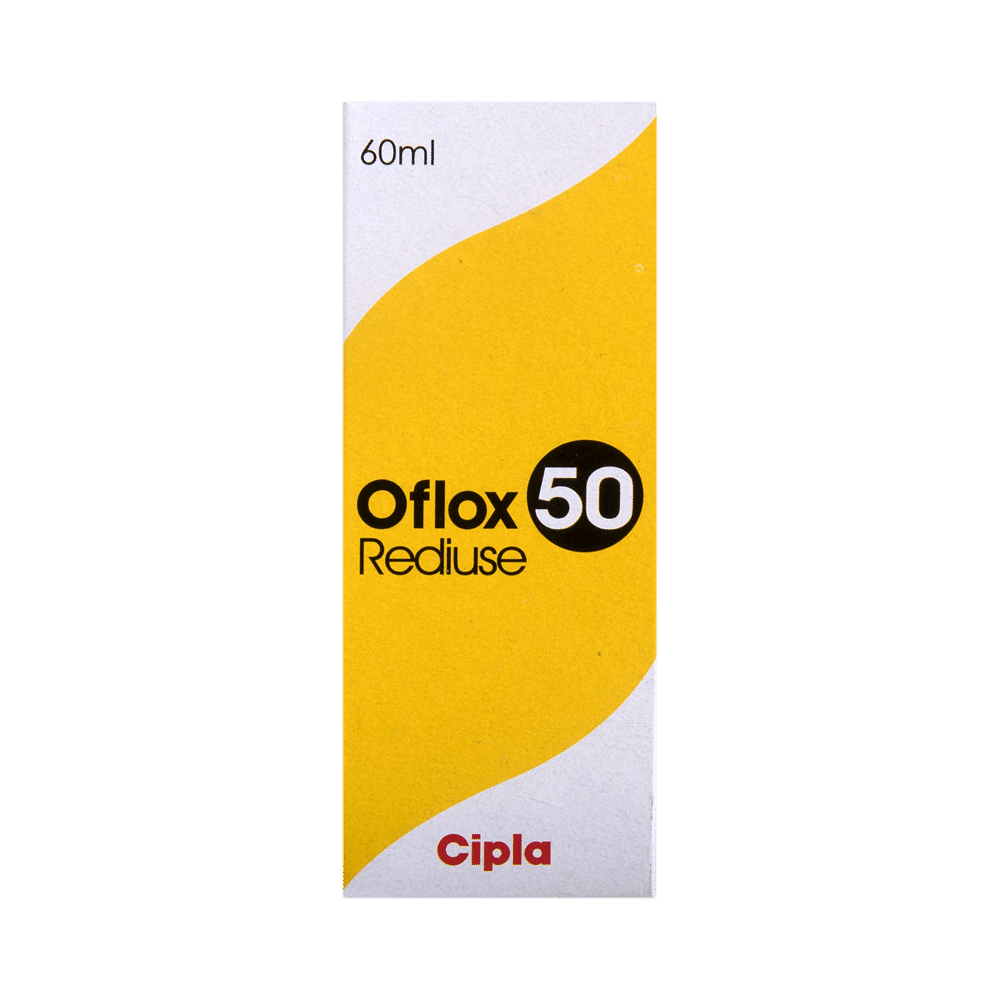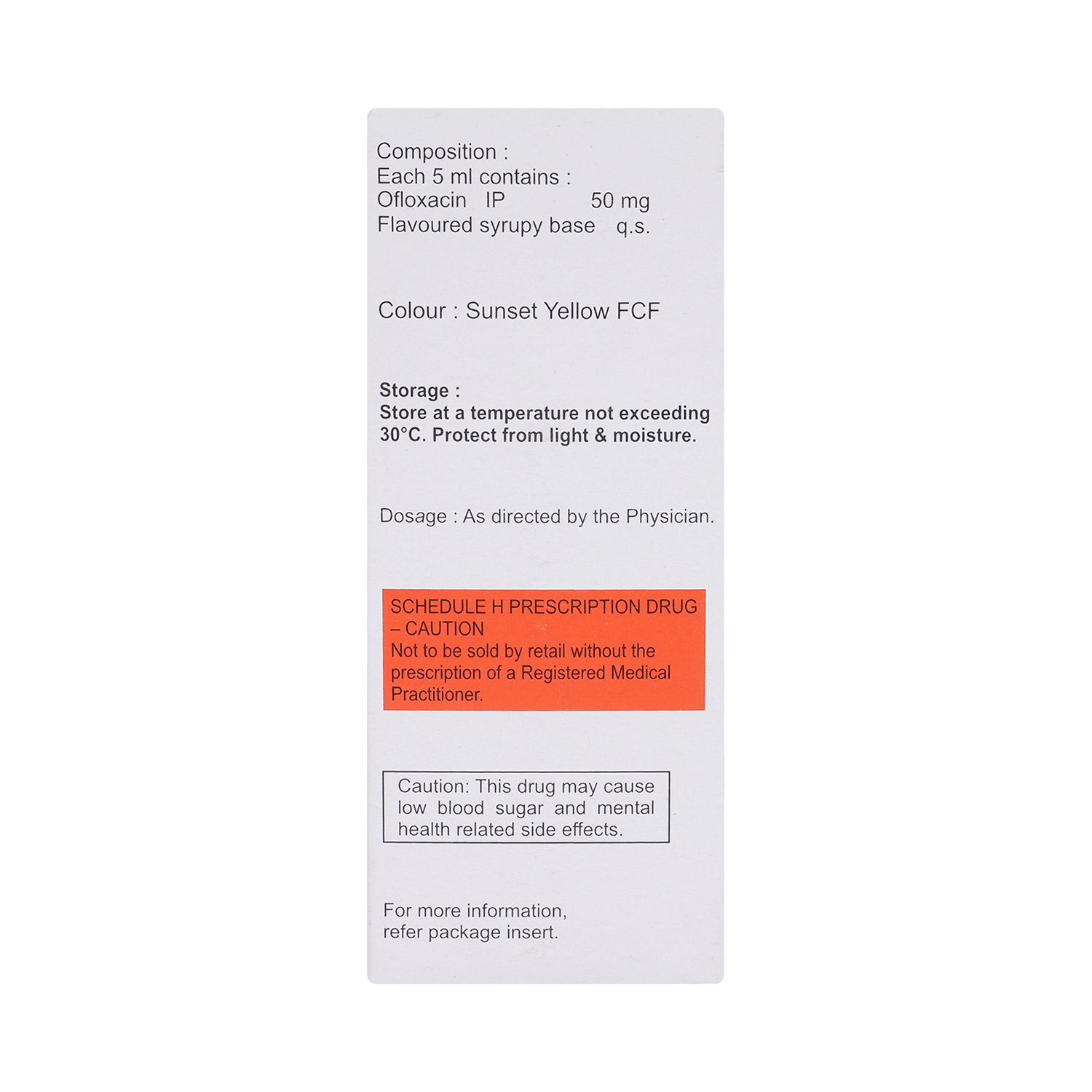
ZO 50mg/5ml Oral Suspension
Manufacturer
FDC Ltd
Salt Composition
Ofloxacin (50mg/5ml)
Key Information
Short Description
ZO 50mg/5ml Oral Suspension is an antibiotic medicine used to treat a wide range of bacterial infections in children, including those affecting the eyes, ears, nose, throat, lungs, skin, and urinary tract.
Dosage Form
Oral Suspension
Introduction
ZO 50mg/5ml Oral Suspension is an antibiotic medicine commonly given to children for the treatment of a wide range of bacterial infections. It is also part of the multidrug-resistant tuberculosis (MDR-TB) treatment regimen. This medicine is used to target the eyes, ears, nose, throat, lungs, skin, and urinary tract.
Directions for Use
Your child must complete the entire course of antibiotics. Stopping too soon may cause the bacteria to multiply again or cause another infection. Do not give any calcium, magnesium, iron, vitamin, or antacid within 2 hours of taking ZO 50mg/5ml Oral Suspension as these can affect the absorption of the medicine.
How it works
ZO 50mg/5ml Oral Suspension is an antibiotic that interferes with the genetic material of bacteria by implanting defects in its DNA. These defects hamper the multiplication of the bacteria and affect its survival as well. Thus, it kills the infection-causing bacteria from growing further and prevents the infection from spreading without making them resistant to further treatment.
Quick Tips
Your child must complete the entire course of antibiotics. Do not give any calcium, magnesium, iron, vitamin, or antacid within 2 hours of taking ZO 50mg/5ml Oral Suspension. Encourage your child to drink plenty of water in case diarrhea develops as a side effect. Conditions like common cold and flu are caused by viruses. Never use this medicine for such conditions. Discontinue ZO 50mg/5ml Oral Suspension and inform the doctor immediately if your child develops a rash, itchy skin, swelling of face and mouth, or has difficulty in breathing.
Related Medicines

Scoff 50mg Oral Suspension

Oflox 50 Rediuse Suspension

Zenflox Suspension

Ropacin 50mg Oral Suspension

Offlix 50mg Oral Suspension

Olatex 50mg Oral Suspension

Onox 50mg Oral Suspension

Oray 50mg Oral Suspension

Sapiflox 50mg Oral Suspension

Oflobest Oral Suspension
Frequently asked questions
What should I do if my child accidentally takes too much of ZO 50mg/5ml Oral Suspension?
If your child has taken more than the prescribed dose of ZO 50mg/5ml Oral Suspension, it is essential to seek immediate medical attention. An overdose can cause severe symptoms such as seizures, tremors, severe headaches, sudden weakness, unconsciousness, and irregular heartbeats. Do not hesitate to contact a doctor or rush your child to the hospital if you notice any of these signs.
What should I do if my child does not show improvement after taking ZO 50mg/5ml Oral Suspension for the prescribed duration?
If your child's symptoms persist despite treatment with ZO 50mg/5ml Oral Suspension, it may be necessary to consult a doctor who can assess the situation and prescribe alternative medication. The doctor may recommend a different antibiotic or adjust the dosage of the existing one.
Can other medications be taken alongside ZO 50mg/5ml Oral Suspension?
It is crucial to inform your child's doctor about any other medications they are currently taking before starting ZO 50mg/5ml Oral Suspension. This will help prevent potential interactions and ensure safe co-administration.
Can my child get vaccinated while on treatment with ZO 50mg/5ml Oral Suspension?
In most cases, antibiotics like ZO 50mg/5ml Oral Suspension do not interfere with vaccine ingredients or cause adverse reactions. However, it is recommended to wait until your child has recovered from the illness before getting vaccinated.
What information should I share with a doctor before giving ZO 50mg/5ml Oral Suspension to my child?
Before administering ZO 50mg/5ml Oral Suspension to your child, inform the doctor about any pre-existing conditions such as heart disease, genetic disorders involving blood vessels, seizures, psychiatric disorders, diabetes, photoallergy, neuromuscular disorders, or rheumatoid arthritis. This will help the doctor assess potential risks and provide appropriate guidance.


